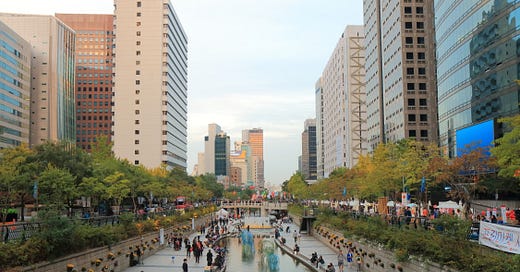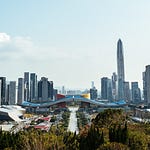Hello everyone!
Our podcast series is back this week with an exciting episode about the power of regenerative design and what it means for cities across Asia.
Wait, what is regenerative design?
For more than three decades, architects, planners, designers and others shaping the built environment have been following and promoting sustainable design. In 1987, the United Nations’ Brundtland Commission defined sustainability as “meeting the needs of the present without compromising the ability of future generations to meet their own needs.”
Sustainability was introduced with good intentions and there has been important progress in terms of energy-efficient buildings, use of materials and resources, change management and general awareness.
But overall, the sustainable design movement has fallen short of the progress needed to prevent substantial environmental damage and climate change. The concept has been so widely misused that it has lost its original meaning.
As architect and circular economy advocate William McDonough observed, if we get to complete sustainability, we simply get to the point of being “100% less bad”.
Our current trajectory in construction, energy use and resource consumption guarantees we will exceed 1.5°C global warming. Across the world, natural habitats continue to be destroyed at an alarming rate.
There is a need for a paradigm shift and the language and terms we use strongly influence the way we tackle our problems.
So enters regenerative design.
The quest for sustainability has moved society forward in important ways, but we believe it is now time to embrace a new regenerative approach to design and development. As a globalized society, we urgently need to reach the turning point in human civilization where everything we do has a net positive impact on the environment. We contend that this is a transformation that is within our reach. It is time to shift from merely mitigating negatives to optimizing positives. We need to embrace approaches that restore ecosystems, reunite divided communities, and reciprocally enhance the interdependent health of people, place and planet – schemes that, in myriad ways, restore what we have lost and deliver compounding net benefits – actualizing regenerative potentials that are beyond the limits of what ‘sustainability’ can imagine.
Sarah Ichioka, Michael Pawlyn, Flourish: Design Paradigms for Our Planetary Emergency

I hope I got you interested in this approach because that’s precisely what we will discuss in today’s episode with Sarah Ichioka.
Sarah is a strategist, urbanist, curator and writer. She is the Founding Director of Desire Lines, a Singapore-based consultancy for environmental, cultural, and social-impact organizations and initiatives. In previous roles, she has explored the intersections of cities, society and ecology within leading international institutions of culture, policy and research, including Singapore’s National Parks Board, La Biennale di Venezia, LSE Cities, NYC’s Department of Housing Preservation & Development, as Director of The Architecture Foundation (UK) and Co-Director of the London Festival of Architecture.
Her new book Flourish: Design Paradigms for Our Planetary Emergency (2021) is co-authored with London-based architect Michael Pawlyn. It’s a wonderful (and engaging) read which unpacks the possibilities offered by regenerative design.
🎙 In our podcast episode, we discuss, among other things:
What it means to transition from “100% less bad” to regenerative design
The story of the Flourish book and its five principal messages
How we could bring regenerative design principles to cities, especially in the context of urban Asia
The various tipping points to change Asia’s complex urban systems and how Doughnut Economics can help us approach Asia’s various development levels
The role of nature-based solutions and indigenous knowledge in today’s work on cities across Southeast Asia
Why there has never been a more exciting time to become a built environment professional: architect, planner, engineer, designer. (possibilism)
It’s a very rich and engaging conversation that I hope will inspire your understanding of what’s coming next for the built environment. Feel free to share this issue & podcast episode around you or drop it into one of your company’s Slack channels 😉
Last but not least, I’d like to thank the Working Capitol team in Singapore for letting us record this episode within their premises. If you’d like to learn more about the story behind this adaptive reuse project, check out the web links below.
🤓 If you want to learn more
The Flourish book and its sister podcast Flourish: Systems Change What will it take to restore balance to our world for future generations’ survival? That’s the question Sarah and Michael explore through their research.
Our coverage of Flourish’s Chapter 3 “ A longer now” and why time is probably one of the most overlooked factors when thinking, designing and planning for the built environment.
A Green Urbanist podcast episode with architect Michael Pawlyn, co-author of the Flourish book. Host Ross O'Ceallaigh asks Michael about regenerative design, biomimicry, indigenous wisdom, systems change and shifting paradigms.
A Planet B: Everything Must Change podcast episode, highly recommended by Sarah (as well as the entire series!).
Activist and journalist Julian Brave NoiseCat explains the importance of land rights and sovereignty in the fight against climate breakdown in an extended interview. Speaking to Harpreet Kaur Paul, he explores the long history of Indigenous resistance to land colonialism and argues that the Indigenous experience of genocide as an apocalyptic event has produced forms of knowledge that could help us adapt to climate breakdown.
The Gotong Royong spirit that we mention during the episode.
Originated from Indonesia, the phrase is translated into English as “cooperation in a community” or “communal helping of one another”, but the closest interpretation is perhaps “mutual aid”. “Gotong royong” involves the spirit of volunteerism, and working together for the benefits of the residents living in the same community.
Our podcast episode on the Working Capitol project and the power of adaptive reuse to create vibrant districts and neighbourhoods
That’s it for today. As usual, a small 💚 at the bottom of this page goes a long way.
Thanks for your support and see you next Wednesday for a new issue.














Share this post